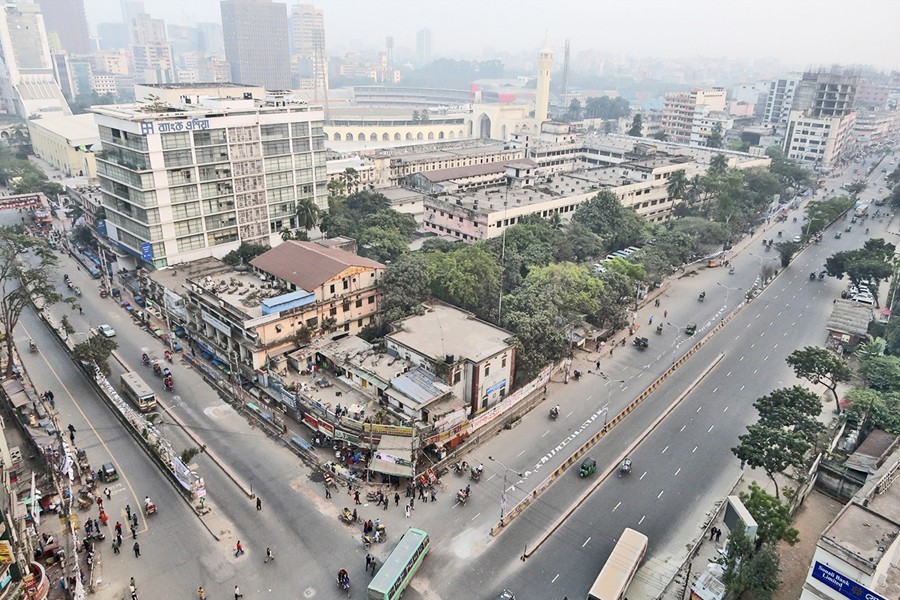Nearly one and half years have passed since the school and college students' countrywide uprising for road safety held between July 29 and August 08 in 2018. The death of two college students in Dhaka after a speeding bus hit them in the capital sparked the movement. With the students' outburst reaching its crescendo and apparently going beyond control, the government weighed in.
Upon listening to the students' grievances and demands, the authorities assured them of taking stringent measures against rule-breaking motorised vehicles. They seemed to be pledge-bound in bringing discipline to the roads. This stance taken by the government witnessed remarkable changes on the busy roads across the country, especially those in Dhaka. The students back to their classes, the law enforcement agencies observed several traffic awareness campaigns in quick succession. Road safety activists took heart from the fact that the student movement, the traffic weeks and various awareness campaigns had at last had a sobering impact on the plying of vehicles.
In the second month of the year of 2020, the roads seem to have reverted to their earlier chaotic state. The present look of the Dhaka roads could be an instance of how a scourge at an opportune moment can crawl back to its former dreadful shape. The distressing point is, the look Dhaka now wears is almost like the one that existed before the 2018 road safety movement.
A lot of new hazardous elements have now been added to the road and traffic movement sectors. They include compulsively defiant jaywalkers, reckless motorcycles, and vehicles breaking traffic signals in careless abandon. The plight of the traffic police overtaken by seizures of helplessness and inertia adds to the list.
One of the startling aspects of the rot appears to be the general people's utter disregard for law. The traffic police department and the allied agencies have seemingly exhausted all their energy and patience in herding the jaywalking passersby into the foot over-bridges nearby. Few of the passersby have the idea that crossing roads at will is a grave offence. These people don't care a fig about the common knowledge that by resorting to jaywalking, they, in fact, push themselves into the jaws of danger.
What sadden many old residents of Dhaka are the spectacles showing a section of apparently educated women averting over-bridges on the roads filled with high-speed vehicles. The reason for bypassing the safe road-crossing facility overhead is utterly silly. Perhaps they are inclined to feel, by not using the road over-bridges they are saving energy and time. The wise words that they are instead courting hazards, including death, by crossing roads haphazardly do not have any appeal to them.
A worse picture that comes across the city people is when they encounter the incredible level the passersby reach while crossing roads. Lots of jaywalkers are seen these days wriggle themselves through the iron fencing erected on the road dividers. A section of women also follow this risk-laden style in road-crossing amid utter nonchalance. In every case, the foot over-bridges are there at places nearby.
This style of crossing roads is becoming common even on the highways and flyovers. All kinds of jaywalking are strictly prohibited on these roads meant for high-speed buses, trucks and covered vans. Few people, including seemingly educated ones, appear to bother about life-threatening hazards they invite in these acts. Deaths and injuries caused to people on being hit by the highway vehicles are these days a normal scenario.
Vehicles cannot be blamed for hitting people who unlawfully cross flyovers and highways. But they are squarely blamed if they hit a passersby crossing through the designated places, the zebra crossings in particular. Defying traffic signals recklessly are a common view in Dhaka. Earlier, a section of notorious minibuses used to be held responsible for a large section of road accidents in Dhaka. Scores of surveys and studies have identified the drivers at the wheels of the minibuses. It has been invariably found that a great number of these private bus and minibus drivers are illiterate, untrained and underage.
A dreadful feature that distinguishes the minibuses is the practice of 'race' between them to reach a certain stoppage ahead of the others. Their only goal is picking the passengers before the rival vehicles could reach the spot. It was one of such competitions between two buses that took the lives of the ill-fated college students waiting for bus at a stoppage. And this terrible accident sparked off the students' movement in Dhaka and elsewhere in the country. Lately, a large section of motorbikes have added to the vehicular recklessness and road anarchy in Dhaka.
A considerable amount of saner behaviour on the part of the bus drivers could be detected on the Dhaka roads after the 2018 student movement. The students were asked to return to their classes by the higher authorities. They made promises to bring the offenders responsible for the death of the two students to justice. Pledges were also made to bring discipline to the roads. To the relief of the capital's road users, the city's scenario appeared to have undergone a series of faint overhauling. Some of the fruits of the remedial measures taken at that time began to be visible.
But watching the traffic scenario against the backdrop of a wide perspective, many find reasons for being filled with discomfort and troubling thoughts.
Seeing the capital's chronic traffic movement ills returning insidiously, the sensitive segments of the people might feel overtaken by the old prescience regarding the traffic sector in Dhaka. Pithily speaking, the conclusion is: the decline in Dhaka's traffic scenario may continue for a longer time. With few signs of real improvement visible at the moment, Dhaka may have to wait a little longer for its emergence as a truly law-abiding modern urban centre in the sector of traffic movement. Losing patience and dodging responsible behaviour will only aggravate the picture.


